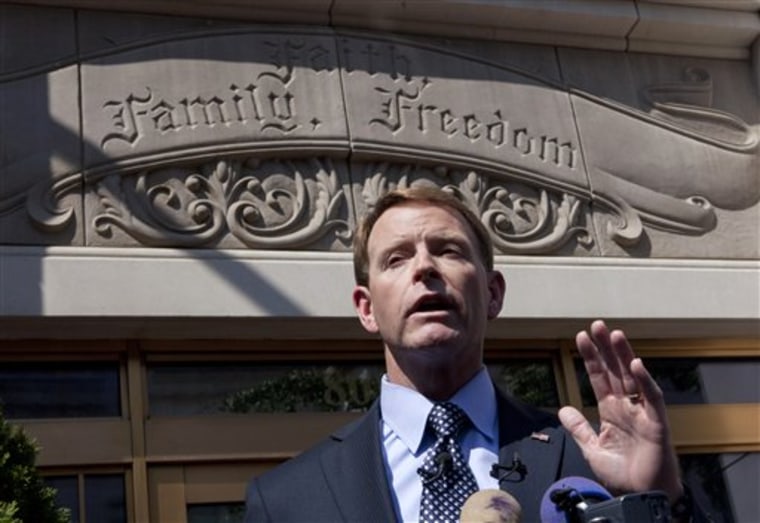For much of the post-9/11 era, there's been a strain of thought on the right that holds American liberalism responsible for Middle Eastern terrorism. This was generally applied to al Qaeda, but yesterday, Tony Perkins, head of a powerful religious right group called the Family Research Council, used the same reasoning when talking about Islamic State.
The Family Research Council's Tony Perkins said today that the separation of church and state in the United States has contributed to the rise of Islamic extremist groups like ISIS, arguing in his radio commentary that ISIS has "filled the void left by secularism." According to Perkins, American ISIS militants wouldn't have left the country to fight for the group if only the government had promoted Christianity over other faiths.
Right Wing Watch published an audio clip of Perkins' minute-long commentary, which was about as offensive as you might imagine.
"Radical secularism that has driven the defining characteristics of our Western culture, our Judeo-Christian heritage, from our schools, our entertainment and even our government has left in its place a void, a vacuum," Perkins argued. "And we should know from experience that a vacuum will be filled by something. Without a creedal vision that a society can unify around, the people, the nation, will perish. Unless we are content to allow ISIS or some other radical belief system to fill the void left by secularism, we must rediscover America's founding, Christ-centered vision."
It's certainly a curious perspective. As Perkins sees it, to counter violent religious extremists, the United States should do more to merge religion and government -- which, ironically, is similar to the approach embraced by our enemy.
While I suspect most of the American mainstream has no use for such nonsense, it's worth noting that Perkins' argument, however odd, is surprisingly common in conservative circles.
In one particularly memorable episode of "The Colbert Report," Dinesh D'Souza conceded that he finds some of the cultural critiques from radical, anti-American extremists persuasive.
Around the same time, Peggy Noonan added, "We make it too easy for those who want to hate us to hate us. We make ourselves look bad in our media, which helps future jihadists think that they must, by hating us, be good."
Glenn Beck argued that when Islamic extremists condemn American depravity, they have a point: "The things that they were saying about us were true. Our morals are just out the window. We're a society on the verge of moral collapse. And our promiscuity is off the charts. Now I don't think that we should fly airplanes into buildings or behead people because of it, but that's the prevailing feeling of Muslims in the Middle East. And you know what? They're right."
And now, here's Tony Perkins, saying that if American society weren't so darned secular, we wouldn't have ISIS threatening to "fill the void left by secularism."
In other words, when it comes to the threat posed by Islamic State, blame begins at home?
